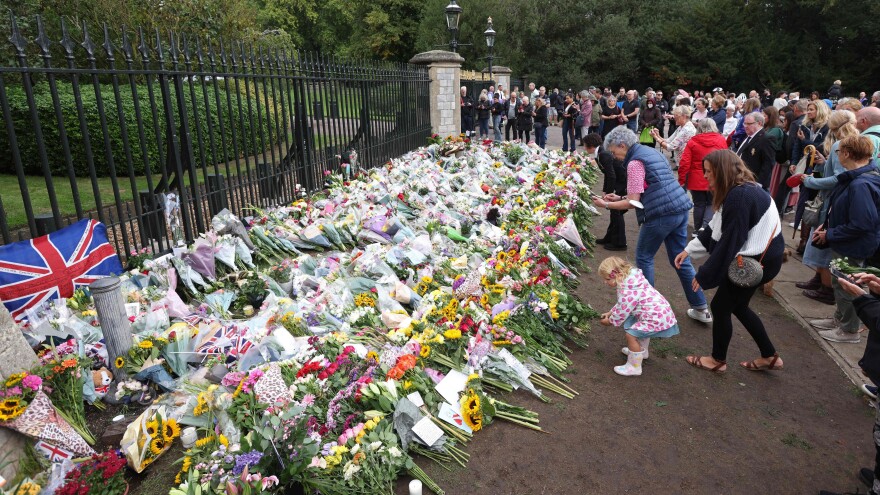Updated September 11, 2022 at 2:53 PM ET
Queen Elizabeth II is being mourned by her family, fans and admirers. In Britain, her death at age 96 has thrown a state apparatus into motion that has sat idle for 70 years — since Elizabeth's father, King George VI, died in 1952.
The British government dubbed the intricate protocol of handling Elizabeth's death "Operation London Bridge." It ranges from succession rules to the process of bringing the queen's coffin from Balmoral Castle in Scotland to London.
The London Bridge plans were leaked to Politico last fall. Some of the details may have changed since then — but using them as a guide, here's a brief look at what the documents say will happen in the first 10 days after the end of the queen's record-setting reign:
Day Zero (Sept. 8)
The royal household notifies the public of the queen's death. Prince Charles immediately succeeds to the throne upon his mother's death. He will be known as King Charles III. His wife, Camilla, becomes queen consort. The couple stay at Balmoral overnight.
Flags fly at half-staff across the British government, and will remain so until 8 a.m. on the morning after the queen's funeral. Charles issues a brief statement, as does U.K. Prime Minister Liz Truss.
Numerous commemorations are planned, from moments of silence to military gun salutes and remembrances in honor of Elizabeth.
The royal family posts an online Book of Condolence on its website.
Day 1 (Sept. 9)
The king announced a period of royal mourning, to be observed until seven days after the queen's funeral on Monday, Sept. 19.
Two 96-round gun salutes honoring the queen — one round for each year of her life — were fired at 1 p.m. local time Friday in London, in Hyde Park and at the Tower of London.
Both houses of Parliament delay their start until noon, when they observe a moment of silence for the late queen. Members then begin delivering tributes, with proceedings expected to run until about 10 p.m.
St. Paul's Cathedral holds a service of prayer and reflection for Elizabeth, starting at 6 p.m. local time. The service is open to up to 2,000 members of the public and is streamed online.
Week 1
On Saturday morning, the Accession Council met at St. James's Palace in London, where it formally declared Elizabeth's death and proclaimed the new sovereign's accession to the throne. Charles then read and signed a centuries-old oath to uphold the security of the Church in Scotland and ensure continuity of government.
On the same day, senior members of Parliament took an oath of allegiance to King Charles III. The two houses continued their tributes and framed a message of condolence to the king.
Meanwhile, in Scotland, a procession will transport the queen's coffin from the Palace of Holyroodhouse to St. Giles' Cathedral in Edinburgh on Monday, Sept. 12. The king and other members of the royal family will take part in the procession and attend a service at the cathedral, after which the public will be able to pay their respects.
On Tuesday, the Royal Air Force will transport Elizabeth's body from Scotland to London.
On Wednesday, a ceremonial procession by the King's Troop Royal Horse Artillery will accompany her coffin from Buckingham Palace to Westminster. There, the Archbishop of Canterbury will conduct a short ceremony, after which she will lie in state at Westminster Hall for several days. The public will be able to visit for 23 hours of each day.
As final funeral preparations are being made in London, Charles will travel to Scotland, Northern Ireland and Wales, visiting leaders in the United Kingdom.
Day 11 (Sept. 19)
On Monday, Sept. 19, a state funeral service will be held at Westminster Abbey, triggering an observance of two minutes' silence in the U.K. World leaders, including President Biden, are expected to attend. Immediately after the service, another procession will take place from Westminster to Wellington Arch in Hyde Park.
Afterward, her coffin will be transported to Windsor Castle, where a final service will be held in St. George's Chapel. Finally, the queen will be buried on the castle grounds next to her husband, Prince Philip, who died in April 2021.
Copyright 2022 NPR. To see more, visit https://www.npr.org.



